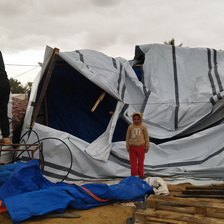The Electronic Intifada 29 April 2025

Sheikh Radwan market is empty as Israel imposes another famine on Gaza.
Sheikh Radwan market, west of Gaza City, looks like a ghost town.
Broken stalls, shuttered shops, and sunken, hungry eyes dominate a place that was once teeming with life.
Israel’s latest ban on allowing food, water, fuel, electricity and medicine into two million people in the Gaza Strip is nearly at its two-month mark.
And as famine rears its head again in Gaza, desperation is setting in.
Markets are empty of food, medicines are scarce and prices are rising.
In a pharmacy near the market, Ihab Ghanem, 32, was asking for a package of formula milk for his youngest child.
“I went to three pharmacies this morning and couldn’t find any type of infant formula,” Ihab told The Electronic Intifada.
His search at Sheikh Radwan market proved equally fruitless and even if it hadn’t, he said, “prices have become exorbitant.”
He was left despairing about the impact on his children’s health.
“I try to feed them simple alternative foods, but it’s not enough, and their digestive systems can’t tolerate it.”
Food as luxury
Elsewhere in the market, Ramez al-Amsi had similarly been trying to find food for his children. Accompanied by his son, Yazan, 3, father and son had been asking about prices.
But the answer was always the same: Supplies are nearly depleted, and prices for what is left are prohibitive.
On the other side of the market, Majdi Shbeir, 26, stood in front of his empty stall. His shop – in the same market – had been destroyed in December 2023, and he had been selling what food supplies he could source in this little improvised stall since.
Now, he has nothing left.
“Customers come and leave because we simply don’t have what they need,” he told The Electronic Intifada.
The famine gripping Gaza also stripped the last holiday season of its joy. Severe food shortages and skyrocketing prices made even the simplest eid traditions such as offering hospitality and sharing sweets impossible for many.
Samar Shaheen, a mother of three, is feeling the scarcity in a way only a parent could.
“Even basic food has become a luxury. This Eid, my children did not ask me for sweets or new clothes,” Samar said. “They only asked if there would be enough food for tomorrow.”
They still do.
Samar, whose home in Beit Lahia was destroyed in September 2024, said she and her children are sheltering in a school given over to displaced families west of Gaza City.
Genocidal grandstanding
On 27 April the UN’s World Food Program announced that it had run out of food in Gaza, 54 days after Israel imposed the total blockade.
That blockade is now being challenged by the UN at the International Court of Justice in the Hague.
Israel remains unrepentant. Responding to the ICJ hearing, Israel’s foreign minister, Gideon Saar, described the UN’s protest against its blockade as part of a “systematic persecution.”
“The UN has become a rotten, anti-Israel, and antisemitic body,” Saar declared on 28 April.
In Gaza, there is little time for such genocidal grandstanding.
Samar al-Tawil, a mother of four, stood in front of an empty stall trying to secure rice at less than exorbitant prices.
“I can no longer tell my children that what they want is unavailable. They keep crying, and their father and I are powerless to find a solution,” she said.
And fresh water is at a premium. With no electricity, the desalination plant in Deir al-Balah has stopped functioning, greatly reducing the availability of fresh water in the north.
In the Al-Saftawi neighborhood in northwest Gaza, Fadwa Hamad, 60, said residents were desperate for water.
“We stand in long lines,” she said, describing how people can wait hours for rare water deliveries. But mindful of Israel’s closure, she said most were in survival mode.
“We just try to ration as much as possible.”
Shaimaa Eid is a journalist based in Gaza.





